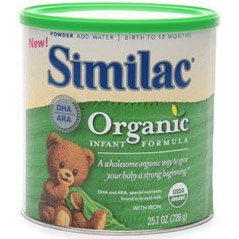The New York Times reports today that parents may be buying Similac Organic baby formula because they believe that organic is healthier, but babies may prefer Similac Organic because it is significantly sweeter than other formulas and is the only major brand of organic formula that is sweetened with cane sugar, or sucrose, which is much sweeter than sugars used in other formulas.
 Dr. Benjamin Caballero, director of the Center for Human Nutrition at the Johns Hopkins Bloomberg School of Public Health and an expert in risk factors for childhood obesity, said,
Dr. Benjamin Caballero, director of the Center for Human Nutrition at the Johns Hopkins Bloomberg School of Public Health and an expert in risk factors for childhood obesity, said,
“I would be very concerned about this as a pediatrician. The issue is that sweet tastes tend to encourage consumption of excessive amounts."
Dr. Caballero was further cited as saying evidence shows that babies and children will always show a preference for the sweetest food available, and they will eat more of it than they would of less-sweet food, adding,
“This is how breakfast cereal manufacturers compete."
Organic formula, with sales of about $20 million annually, makes up only a sliver of the $2.5 billion formula market, according to A.C. Nielsen, the market research company. Similac Organic, analysts say, is largely responsible for the nearly tenfold growth in sales of organic formula from 2005 to 2007.
All infant formulas contain added sugars, which babies need to digest the proteins in cow’s milk or soy. Other organic formulas, like Earth’s Best and Parent’s Choice, use organic lactose as the added sugar. Organic lactose must be extracted from organic milk, the global supplies of which have been severely stretched in the last three years, driving up the price of the lactose.
Dr. Jatinder Bhatia, a member of the nutrition committee of the American Academy of Pediatrics, said,
"The parents in my practice who would use organic formula are the same parents who would be worried about giving sweets to their babies. That organic formula would be sweeter might not be a health risk, but it certainly isn’t what the parents have in mind.”
Dr. Gary K. Beauchamp, director of the Monell Chemical Senses Center in Philadelphia, a nonprofit research institute, said,
“The entire enterprise of formula is the attempt is to make it as close as possible to human milk. Making sweeter formula so that babies like it more seems to me contrary to the ethos of organic food, as a doctor and as a grandfather.”

 Organic myths:
Organic myths:
.jpg) "[Consumers] perceive that organic food is going to be safer. Whether that’s true or not is a whole other issue. We don’t make food safety claims."
"[Consumers] perceive that organic food is going to be safer. Whether that’s true or not is a whole other issue. We don’t make food safety claims." But there is lots of evidence that people get sick from fresh produce —
But there is lots of evidence that people get sick from fresh produce —  Julie Scelfo reports in the Sept. 24, 2007 issue of
Julie Scelfo reports in the Sept. 24, 2007 issue of  In my food safety travels, I’ve heard — and seen — a lot of things. And I’ve repeatedly heard that many of those urban vegetable gardens, especially those producing for certain cultural sub-groups, make use of human feces as a form of fertilizer.
In my food safety travels, I’ve heard — and seen — a lot of things. And I’ve repeatedly heard that many of those urban vegetable gardens, especially those producing for certain cultural sub-groups, make use of human feces as a form of fertilizer.